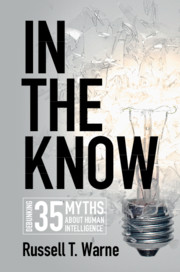Book contents
- In the Know
- In the Know
- Copyright page
- Dedication
- Contents
- Figures
- Tables
- Acknowledgments
- Preface
- Introduction
- Section 1 The Nature of Intelligence
- 1 Intelligence Is Whatever Collection of Tasks a Psychologist Puts on a Test
- 2 Intelligence Is Too Complex to Summarize with One Number
- 3 IQ Does Not Correspond to Brain Anatomy or Functioning
- 4 Intelligence Is a Western Concept that Does Not Apply to Non-Western Cultures
- 5 There Are Multiple Intelligences in the Human Mind
- 6 Practical Intelligence Is a Real Ability, Separate from General Intelligence
- Section 2 Measuring Intelligence
- Section 3 Influences on Intelligence
- Section 4 Intelligence and Education
- Section 5 Life Consequences of Intelligence
- Section 6 Demographic Group Differences
- Section 7 Societal and Ethical Issues
- References
- Index
4 - Intelligence Is a Western Concept that Does Not Apply to Non-Western Cultures
from Section 1 - The Nature of Intelligence
Published online by Cambridge University Press: 22 October 2020
- In the Know
- In the Know
- Copyright page
- Dedication
- Contents
- Figures
- Tables
- Acknowledgments
- Preface
- Introduction
- Section 1 The Nature of Intelligence
- 1 Intelligence Is Whatever Collection of Tasks a Psychologist Puts on a Test
- 2 Intelligence Is Too Complex to Summarize with One Number
- 3 IQ Does Not Correspond to Brain Anatomy or Functioning
- 4 Intelligence Is a Western Concept that Does Not Apply to Non-Western Cultures
- 5 There Are Multiple Intelligences in the Human Mind
- 6 Practical Intelligence Is a Real Ability, Separate from General Intelligence
- Section 2 Measuring Intelligence
- Section 3 Influences on Intelligence
- Section 4 Intelligence and Education
- Section 5 Life Consequences of Intelligence
- Section 6 Demographic Group Differences
- Section 7 Societal and Ethical Issues
- References
- Index
Summary
The leading figures in intelligence research – both past and present – are individuals who come from Western cultures. Because intelligence research and testing originate in Western cultures, it would be naïve to believe that Western culture does not influence the development of intelligence theories, research, and tests. As a result, many people argue that the perspectives of psychologists who study intelligence – and develop intelligence tests – are ethnocentric (e.g., Berry, 1974; Gardner, 2004; K. Richardson, 2002; Sternberg, 1985). In this viewpoint, intelligence, as understood by Western scientists, is at best too narrow. At worst, the concept is so foreign that it doesn’t even make sense to study or measure intelligence in non-Western individuals. Critics like Vernon (1965, 1969) say that Western views of intelligence are incompatible with views originating in other cultures and that one must consider these groups’ views of intelligence when studying mental 47 abilities.
- Type
- Chapter
- Information
- In the KnowDebunking 35 Myths about Human Intelligence, pp. 46 - 51Publisher: Cambridge University PressPrint publication year: 2020



